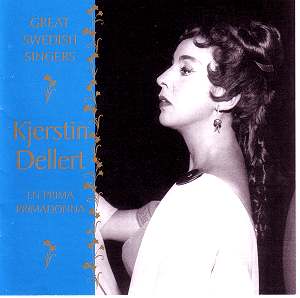 Kjerstin
Dellert: En Prima Primadonna
Kjerstin
Dellert: En Prima Primadonna
Gershwin (1898-1937)
1. The Man I Love [3:41]
Porgy and Bess:
2. My Man's Gone [4:27]
Millöcker (1842-1899)
Die Dubarry:
3. Ich schenk mein Herz [2:21]
von Suppé (1819-1895)
Boccaccio:
4. Mia bella Fiorentina [6:05]
Lehár (1870-1948)
Zigeunerliebe:
5. Hör ich Cymbalklänge
[3:47] Weill (1900-1950)
Die Dreigroschenoper:
6. Seeräuberjennys Lied
[2:58]
Puccini (1858-1924)
La Bohème:
7. Quando me'n vo soletta [2:49]
Bizet (1838-1875)
Carmen:
8. Près des ramparts de Séville
[3:50]
R Strauss (1864-1949)
Der Rosenkavalier:
9. Mir ist die Ehre widerfahren [5:55]
Blomdahl (1916-1968)
Aniara:
10. Libidellavisan [3:37]
Rosenberg (1892-1985)
Josef och hans bröder (Joseph and
his brothers, oratorio):
11. Förgäves har jag kämpat
[3:27]
Leoncavallo (1858-1919)
Pagliacci:
12. Qual fiamma avea nel guardo
[4:40]
13. E allor perché [3:34]
Berg (1885-1935)
Wozzeck:
14. Maries Wiegenlied [4:10]
Wagner (1813-1883)
Tannhäuser:
15. Geliebter, komm [9:50]
Kjerstin Dellert (soprano), Per Grundén
(tenor) (4), Arne Hendriksen (tenor)(8),
Eva Prytz (soprano)(9), Ingvar Wixell
(baritone) (13), Set Svanholm (tenor)
(15),Swedish Radio Light Orchestra/Åke
Jelving(1), Egon Kjerrman (2, 4, 7),
Cabaret Orchestra, Stockholm/Åke
Jelving (3, 5), Studio Ensemble/Stig
Rybrant (6), Royal Orchestra, Stockholm/Sixten
Ehrling (8-10, 14, 15), Stig Westerberg
(11), Bertil Bokstedt (12, 13)
rec. 1955-1962
BLUEBELL ABCD 083 [66:38]
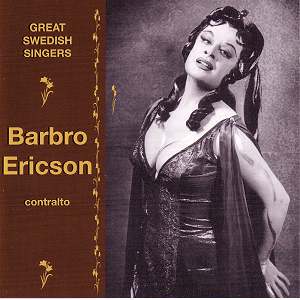 Barbro
Ericson: Contralto
Barbro
Ericson: Contralto
Verdi (1813-1901)
Don Carlo:
1. O don fatale [4:31]
Requiem:
2. Liber scriptus [4:46] 3. Recordare
[4:11]
Aida:
4. Fu la sorte dell'armi [9:33]
Un ballo in maschera:
5. Re dell'abisso, affrettati
[6:07]
Nielsen (1865-1931)
Maskarade:
6. Är det någon inne?(Magdelone's
dance scene)[7:44]
Saul og David:
7. Vem bultar? [6:30]
Wagner (1813-1883)
Lohengrin:
8. Elsa! - Wer ruft? [5:29]
Das Rheingold:
9. Weiche, Wotan, weiche! [5:34]
Tchaikovsky (1840-1893)
The Queen of Spades:
10. Ach, postyl mne etot svet
[6:23]
Mussorgsky (1839-1881)
Boris Godunov:
11. Dimitrij! Tsarevitj! (Garden
scene)[11:07]
Barbro Ericson (contralto), Elisabeth
Söderström (soprano) (3),
Anita Välkki (soprano) (4), Sven-Olof
Eliasson (tenor) (5), Gösta Winbergh
(tenor), Carl-Johan Falkman (baritone),
Arne Tyrén (bass) (6), Bo Lundborg
(baritone), Sigurd Björling (baritone)
(7), Aase Nordmo-Løvberg (soprano)
(8), Ragnar Ulfung (tenor) (11), Royal
Orchestra and Chorus/Herbert Sandberg
(1), Sixten Ehrling (4), Silvio Varviso
(5, 8), Okko Kamu (6), Vaclav Kaslik
(10), Bohumil Gregor (11), Swedish Radio
Symphony Orchestra/Stig Westerberg (2,
3), Tor Mann (7), Gunnar Staern (9)
rec. 1957-1973)
BLUEBELL ABCD 094 [73:17]
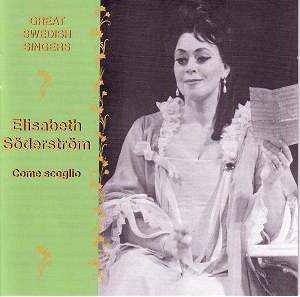 Elisabeth
Söderström: Come scoglio
Elisabeth
Söderström: Come scoglio
Busoni (1866-1924)
Doktor Faust:
1. Er ruft mich wie mit tausend Stimmen
[6:40]
Ravel (1875-1937)
Sheherazade:
2. Asïe [8:21]
3. La flûte enchantée
[2:25]
4. L'indifferént [2:59]
R Strauss (1864-1949)
Der Rosenkavalier:
5. Kann mich auch an ein Mädel
erinnern [3:58]
Puccini (1858-1924)
Manon Lescaut:
6. Tu, tu, amore? [7:19]
Suor Angelica:
7. Senza mamma [4:51]
Wagner (1813-1883)
Die Meistersinger von Nürnberg:
8. Gut'n Abend, Meister! [8:34]
Flotow (1812-1883)
Martha:
9. Nur näher, schöne Mädchen
(Quartet act 2) [8:41]
Mozart (1756-1791)
Le nozze di Figaro:
10. Deh vien, non tardar [3:34]
Così fan tutte:
11. Come scoglio [5:35]
Berwald (1796-1868)
Drottningen av Golconda:
12. Du hatar ej den sorg [8:05]
Elisabeth Söderström (soprano),
Åke Ljungholm (tenor) (6), Sigurd
Björling (baritone) (8), Siw Eicsdotter
(soprano), Nicolai Gedda (tenor), Folke
Jonsson (bass) (9), Royal Orchestra,
Stockholm/Leif Segerstam (1), Sixten
Ehrling (5), Herbert Sandberg (8), Stig
Westerberg (12), Malmö Symphony
Orchestra/Stig Rybrant (2-4), Malmö
Radio Orchestra/Stig Rybrant (6), Swedish
Radio Symphony Orchestra/Sixten Ehrling
(7), Colin Davis (10), Stig Westerberg
(11), Swedish Radio Orchestra/Stig Rybrant
(9)
rec. 1952-1977
BLUEBELL ABCD 095 [72:11]
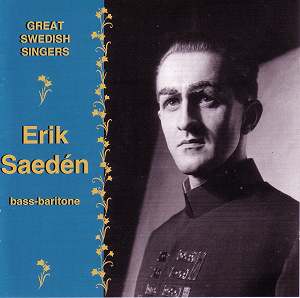 Erik
Saedén: Bass-baritone
Erik
Saedén: Bass-baritone
Donizetti (1796-1848)
L'Elisir d'amore:
1. Udite, o rustici [6:17]
Wolfgang Amadeus
MOZART Mozart (1756-1791)
Le nozze di Figaro:
2. Hai già vinta la causa?
[4:44]
Du Puy (ca. 1770-1822)
Ungdom og galskab: 3. God natt kabaler!
[6:33]
Wilhelm PETERSON-Peterson-Berger (1867-1942)
Arnljot:
4. Alltjämt de mäktiga
fjäll sig välva [7:56]
Blomdahl (1916-1968)
Aniara:
5. Förflyttningen till Tundra
tre [6:10]
Verdi (1813-1901)
Macbeth:
6. Mi si addaccia un pugnal?
[8:22]
Il trovatore:
7. All'erta! All'erta! [6:14]
Un ballo in maschera:
8. Libero è il varco a voi
[4:22]
Gounod (1818-1893)
Faust:
9. Le veau d'or [2:41]
R Strauss (1864-1949)
Elektra:
10. Ich muss hier warten [8:33]
Mendelssohn (1809-1847)
Paulus:
11. Gott sei mir gnädig
[5:42]
Kern (1885-1945)
Show Boat:
12. Ol' Man River [3:01]
Erik Saedén (bass-baritone),
Margareta Hallin (soprano) (6), Birgit
Nordin (soprano), Ragnar Ulfung (tenor)
(8), Birgit Nilsson (soprano) (10),
Drottningholm Chamber Orchestra and
Chorus/Charles Farncombe (1), Swedish
Radio Orchestra/Sten Frykberg (2), Norrköping
Radio Orchestra/Stig Rybrant (3), Swedish
Radio Symphony Orchestra/Kurt Bendix
(4), Frieder Meschwitz (9), Torsten
Nilsson (11), Royal Orchestra Stockholm/Sixten
Ehrling (5), Carlo Felice Cillario (6),
Herbert Sandberg (7, 8), Berislav Klobucar
(10), Swedish Radio Light Orchestra/Jerry
Högstedt (12)
rec. 1959-1980
BLUEBELL ABCD 098 [71:49]
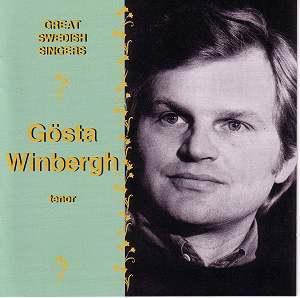 Gösta
Winbergh: Tenor
Gösta
Winbergh: Tenor
Wolfgang Amadeus
MOZART Mozart (1756-1791)
La clemenza di Tito:
1. Del più sublime soglio
[3:00]
2. Ah, se fosse intorno [2:36]
Giacomo MEYERBEER
Meyerbeer (1791-1864)
L'Africaine:
3. Ô Paradis! [3:27]
Gounod (1818-1893)
Faust:
4. Mon Coeur est pénétré
[9:46]
Wagner (1813-1883)
Die Meistersinger von Nürnberg:
5. Mein Herr! Der Singer Meisterschlag
[7:16]
6. Gleich, Meister! Hier! [7:31]
Delibes (1836-1891)
Lakmé:
7. D'où viens tu? [7:05]
Massenet (1842-1912)
Manon:
8. J'ai marqué l'heure du
départ [8:11]
Cilea (1866-1950)
L'Arlesiana:
9. È la solita storia
[4:50]
Nielsen (1865-1931)
Maskarade:
10. Roser! Roser! [4:34]
Debut 1971
- Stora Teatern, Gothenburg:
Puccini (1858-1924)
La Bohème:
11. Che gelida manina [4:28]
12. Marcello! Finalmente! [4:40]
13. In un coupé? - O Mimi
[4:07]
Gösta Winbergh /tenor), Elisabeth
Söderström (soprano), Erik
Saedén (bass-baritone)(4), Sven-Olof
Eliasson (tenor) (5), Leif Roar (baritone)
(6), Britt-Marie Aruhn (soprano) (7),
Gunnel Bohman (soprano) (8), Anita Soldh
(soprano) (10), Christina Gorne (soprano)
(12), Per Stokholm (baritone) (12, 13),
Swedish Radio Symphony Orchestra/Gary
Bertini (1, 2), Frieder Meschwitz (3,
9), Ulf Söderblom (4, 7), Royal
Orchestra/Berislav Klobucar (5, 6),
Okko Kamu (10), Norrköping Symphony
Orchestra/Franz Welser-Möst (8),
Stora Teatern Orchestra, Gothenburg/Gunnar
Staern (11-13)
rec. 1971-1987
BLUEBELL ABCD 099 [72:49]
The Swedish independent
company Bluebell has for more than a
decade been issuing material from the
Swedish Radio archives under the collective
title "Great Swedish Singers".
This has been an enormously valuable
cultural mission that should not only
be lauded in written panegyrics but
also result in some financial return.
Less than a year ago I reviewed a disc
with Birgit Nilsson, mainly recorded
during the early 1960s (review)
and just recently a 2 CD set of mostly
unpublished recordings with Jussi Björling
came my way. Here I have collected six
CDs from Bluebell's back catalogue.
I hope that I will be able to come back
with some more.
Of these six singers,
Elisabeth Söderström shouldn't
need an introduction, well known from
loads of recordings, not least as the
natural choice of heroine in several
of Charles Mackerras's prize-winning
series of Janacek operas for Decca.
Gösta Winbergh also had an important
international career, took part in a
number of complete opera recordings,
but unfortunately his assumption of
the heavier repertoire gradually embraced
during the last decade or so of his
life, remained unrecorded, apart from
a good Meistersinger on DVD.
There is however a recording on Naxos
of his Florestan in Fidelio which
should definitely be heard. The other
four singers remained loyal to the Royal
Opera in Stockholm, even though they
would have been assets on the international
circuit and also made guest appearances
abroad.
All of them made commercial
recordings but mostly in non-operatic
repertoire. Besides the opportunity
to hear some of the most prominent singers
from one Golden Age of Swedish opera
singing, these discs also mirror the
wide scope of repertoire at the Royal
Opera, not least including Swedish and
other Scandinavian rarities. A couple
of excerpts are from world premieres,
most important perhaps, scenes from
Karl-Birger Blomdahl's space opera Aniara,
which made quite a stir when it was
premiered on 31 May 1959. Both Erik
Saedén and Kjerstin Dellert sing
snippets from this occasion. It should
also be mentioned that Caprice recorded
the opera complete in the 1980s with
Saedén again singing the Mimarobe.
We also get music from epoch-making
performances like Wozzeck, Nielsen's
Maskarade and Saul og David, Busoni's Doktor Faust and Berwald's
Drottningen av Golconda and,
on Saedén's disc, the most famous aria from what was once
regarded as the Swedish national opera, Wilhelm Peterson-Berger's Arnljot. The discs also give us some
glimpses of other great singers at the Royal Opera: Nicolai Gedda,
Per Grundén - for many years the great operetta favourite in
Vienna, legendary Wagner tenor Set Svanholm, Ingvar Wixell, Sigurd
Björling - Bayreuth's first Wotan after the war,
Aase Nordmo-Lövberg, Ragnar Ulfung
and Birgit Nilsson as Elektra, recorded
at her very first performance of a role
that became one of her greatest. Quite
a lot of the excerpts are sung in Swedish,
which was common practice in those days.
The sound is variable,
considering age and provenance, but
it is never less than acceptable and
in most cases quite comparable to regular
studio recordings of the same age. Some
of the music was recorded at the Royal
Opera, quite a lot at sundry concerts
and there are also, on the Margareta
Hallin disc, a couple of commercial
studio recordings: the Queen of the
Night and Violetta arias are from a
Telefunken (as it was then) EP, recorded
at the beginning of her career when
everybody counted on a brilliant international
future for her. The Rosina aria from
Barbiere, is even earlier, recorded
the same year as her debut (in this
role) as part of an LP with around a
dozen singers from the Royal Opera.
This recording should give this a new
lease of life on CD. EMI please take
note!
A few comments on the
separate discs and singers:
Margareta Hallin
was a sensation from the very
beginning and few sopranos of her or
indeed any generation can challenge
her when it comes to brilliant coloratura,
beauty of voice and sense of style.
I first heard her live as Konstanze
in Die Entführung aus dem Serail
in the late 1960s and no singer to my
knowledge has ever surpassed her in
this role. The same goes for her Rosina,
Queen of the Night and Violetta. Especially
the last-named was for many years her
signature role; I don't know how many
times I enjoyed it in the theatre. Her
Lucia need fear competition from very
few and we also get her in somewhat
heavier repertoire, which she gradually
essayed with great success: Aida is
heard here, she was a wonderful Leonora
in Il trovatore (there was once
a highlights LP with Rolf Björling,
Jussi's son, singing Manrico), her Lady
Macbeth can be heard on the Saedén
disc and her last new role was Medea,
which I hope will one day be available
from the archives. Those who feel reluctant
to invest in the whole series at once
should definitely start here.
Kjerstin Dellert
was, and is, one of the most versatile
of Swedish singers. Born in 1925 she
started singing in the 1940s and has
appeared in all kinds of repertoire
from contemporary opera to jazz and
ABBA and also as a speaking actor. She
even has several film roles to her credit.
In the early 1970s she and Elisabeth
Söderström had a series of
enormously popular TV-shows, "Prima
Primadonnas", and she has during
the last few decades devoted much time
and effort to the resuscitation of the
Confidencen court theatre at Ulriksdal
just north of Stockholm. She loved to
cross borders and a few borders are
also crossed on her thrilling disc,
where besides the excerpt from Aniara,
Marie's lullaby from Wozzeck
is a fine memento of one of her most
prominent creations.
Barbro Ericson
was that rarest of things, a really
fruity, deep, thundering contralto.
She had a stage presence comparable
to Kjerstin Dellert's and while her
acting wasn't as many-faceted as Ms
Dellert's she was the most commanding,
both visually and vocally. Something
of this is inevitably lost on a sound-only
disc but there is enough left to convince
even those who never saw her. Eboli,
Amneris and Ulrica are magnificent and
she was also a great Wagnerian, which
the Lohengrin and Rheingold
excerpts give evidence of. Her Fricka
in Die Walküre, which I
saw in the early 1970s, singing against
the monumental Sigurd Björling,
was also something quite exceptional.
Her Kundry can be seen on the CD cover
above.
It is a pity that Elisabeth
Söderström was
never granted an opportunity to record
Der Rosenkavalier complete, since
her Feldmarschallin was so special.
She first sang Sophie and later Octavian,
and this assumption is preserved on
a Decca highlights disc, recorded in
the mid-1960s, with Silvio Varviso conducting.
Hilde Güden was a still youngish
Sophie and Régine Crespin a marginally
fresher Marschallin than on her complete
set with Solti a few years later. There
is a glimpse of Ms Söderström's
Marschallin on an all-Strauss recital
on EMI with Vier letzte Lieder,
recorded a few years too late, so the
four minutes from her first act monologue
on the present disc, recorded in 1960
when she was about the same age as the
Feldmarschallin is supposed to be, are
something to treasure. Swedish Television
should have in their vaults a complete
Rosenkavalier, though - something
for release on DVD? Otherwise she is
a lovely Susanna in Le nozze di Figaro
and of course the perfect Fiordiligi.
In the very early quartet from Martha, with the imposing
bass Folke Jonsson and Nicolai Gedda, only a half year after his
official debut in Stockholm, she is a youthfully twittering Lady
Harriet. Ravel's Shéhérazade
is unfortunately sung in Swedish but
it is still wonderful to have it on
disc and there is fine rapport between
her Eva and Sigurd Björling's Hans
Sachs.
Erik Saedén
was, and is, one of the great singing
actors of all times, and also in the
relatively small role as the Speaker
in Ingmar Bergman's legendary Die
Zauberflöte film, he made his
mark immediately. As time went on his
voice dried out somewhat and lost something
of its magisterial sonority but his
acting and expressiveness remained undiminished
and no singer to my knowledge has enunciated
the text with such pregnancy. This can
be heard on all the tracks here. His
Macbeth, represented by a scene from
the first act with a somewhat over-vibrant
Margareta Hallin, was really spine-chilling.
His Almaviva in Le nozze di Figaro
was not to be trifled with. He is a
memorable Mephistofeles and shows his
cavernous depth in Ol' Man River.
The only thing I regret is that room
could not be found for his priceless
Beckmesser in Götz Friedrich's
superb Die Meistersinger von Nürnberg, premiered in
1977 - can it really be that long ago? This is another production
that was televised so I must add this one too to my wish-list - as I would
the Göran Gentele-Sixten Ehrling
Un ballo in maschera, from which
there is an excerpt here where we also
encounter Ragnar Ulfung's brilliant
Gustavus.
The sixth singer here,
Gösta Winbergh, belonged
to a later generation than the others
and tragically died all too early while
still at the top of his trade. He started
as a quite lyrical singer, much sought
after as a Mozart interpreter of exceptional
elegance. During the 1990s he moved
over to heavier fields, adding Lohengrin,
Walther von Stolzing, Parsifal, Tristan
and Siegmund, roles that are not represented
here. There is however a Sony disc where
we get central parts from Lohengrin
and Meistersinger. Here we hear him, besides three
excerpts from his 1971 debut as Rodolfo in Gothenburg, in Mozart,
some French repertoire and a duet from Nielsen's Maskarade,
an opera in which I admired him very
much. Also there are two scenes from
the aforementioned Meistersinger,
where he was a lively and eager David.
At the time, Leif Aare wrote prophetically
in Dagens Nyheter that in ten years
time he will be a great Walther. Considering
Winbergh's very lyrical voice in 1977,
I much doubted this prophecy, but Aare
was right and few tenors of the day,
Heppner and Domingo apart, could challenge
him. In due time I hope Bluebell will
be able to produce a disc with the "mature"
Winbergh. As it is we have him here
as the very fine lyrical tenor from
which he started.
There are informative
biographical notes in Swedish and English
and I would urge readers to give this
series a try. They do indeed cover a
very important period in the annals
of Stockholm's Royal Opera.
Göran Forsling

